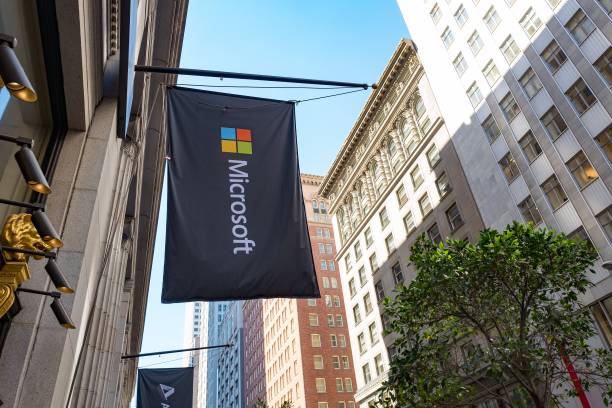Microsoft finds itself ensnared in a predicament no corporation covets: the focus of adverse global headlines. Yet, the plethora of value-fund managers devoted to this stock are likely to disregard the uproar, and investors should perhaps follow suit. Microsoft stock fell 0.7%, or $3.26, closing at $437.11 on Friday, after an overnight IT debacle disrupted Windows computer systems worldwide. The issues, seemingly linked to a software update from cybersecurity firm CrowdStrike, left thousands of travelers stranded and hampered operations at financial institutions like Charles Schwab. Despite Friday’s setback, Microsoft has surged approximately 27% over the past year. While tech-stock enthusiasts are not typically known for ignoring hype, Microsoft boasts an unexpected following of steadfast supporters. Approximately 44% of large-cap value managers own Microsoft shares, according to Morningstar data. While some hold minimal stakes, others count Microsoft among their top holdings. In comparison, only about 25% of large value funds own Meta Platforms, and 10% own Amazon.com.
Microsoft’s inclusion in value funds may seem incongruous given its price-to-earnings ratio of 38, compared to 26 for the S&P 500. However, as Morningstar analyst Jack Shannon points out, many value managers seek to acquire undervalued stocks and hold them long-term, until the market acknowledges their true value. As recently as 2014, Microsoft’s P/E ratio was a mere 14, and in 2012, it stood at just 10 times earnings.
Microsoft’s business model exhibits attributes that appeal to value-oriented investors. Globally, businesses rely on Microsoft’s Office suite for productivity. While the recent news highlights the drawbacks of such ubiquity, it also underscores Microsoft’s formidable defense against competition, making it challenging for even disgruntled users to consider alternatives.

A substantial portion of Microsoft’s revenue—from both its Office products and its highly profitable Azure cloud-computing division—is recurrent. Clients essentially commit to subscriptions that generate predictable revenue streams, notes CFRA analyst Angelo Zino. “The visibility is something investors really appreciate” he says.
Beyond this, Microsoft’s high-profile collaboration with OpenAI represents a rapidly expanding business opportunity, albeit with higher risks and rewards. Zino estimates AI contributes about six to seven percentage points to Azure’s 30% annual growth rate, a figure expected to rise over time. It’s no wonder value managers are reluctant to part with Microsoft. Friday’s incident is unlikely to sway their stance. “This just underscores everyone’s dependency on Microsoft,” remarked Jonathan Boyar, co-manager of the Boyar Value Fund, in a Friday morning interview. The fund has allocated more than 10% of its assets to Microsoft, its second-largest holding. Boyar notes the fund acquired Microsoft in 2006, when it traded at just 12 times earnings. They have not sold, partly to avoid triggering substantial capital gains for clients, but also because Microsoft remains a compelling investment. “It’s a high-quality, industry-leading business,” he stated. “We believe it will dominate for years to come.”
McCoy Penninger, co-manager of Union Street Partners Value Fund, echoes this sentiment. Microsoft is the fund’s largest holding, also representing over 10% of the portfolio. The fund has held Microsoft since its inception in 2011. “Since CEO Satya Nadella took the helm, Microsoft has made astute strategic moves, positioning itself to thrive in emerging tech markets like Cloud and AI,” he wrote in an email Friday. “The notion of running a business without utilizing a Microsoft product is nearly unimaginable.”



